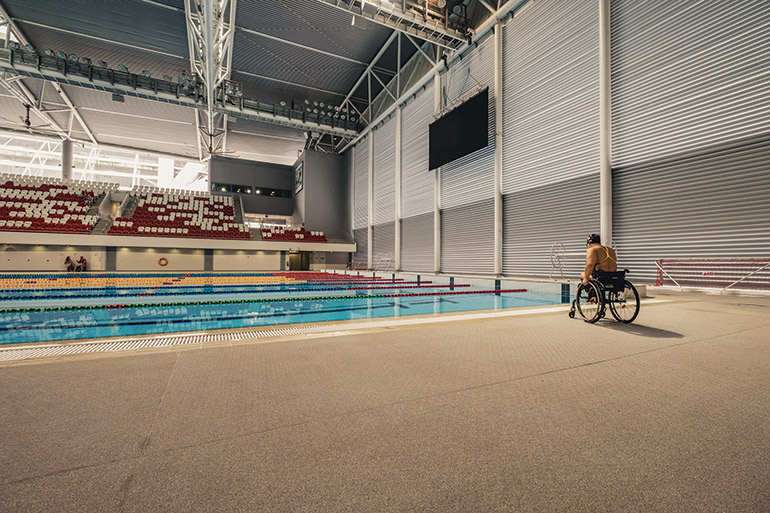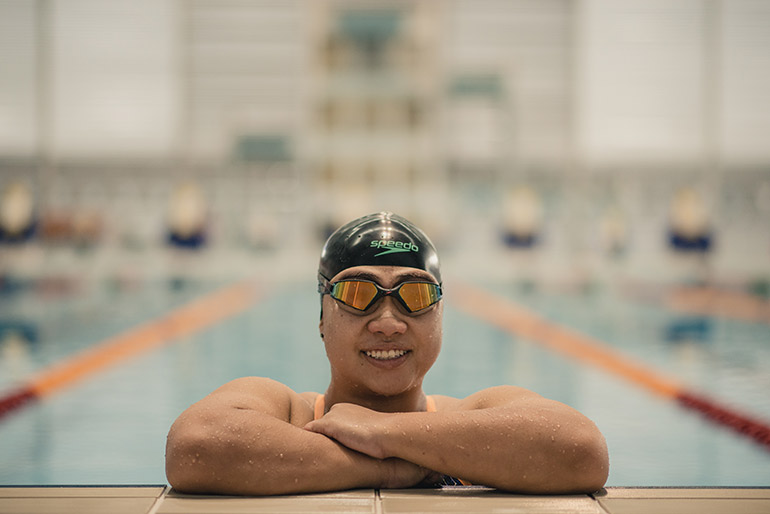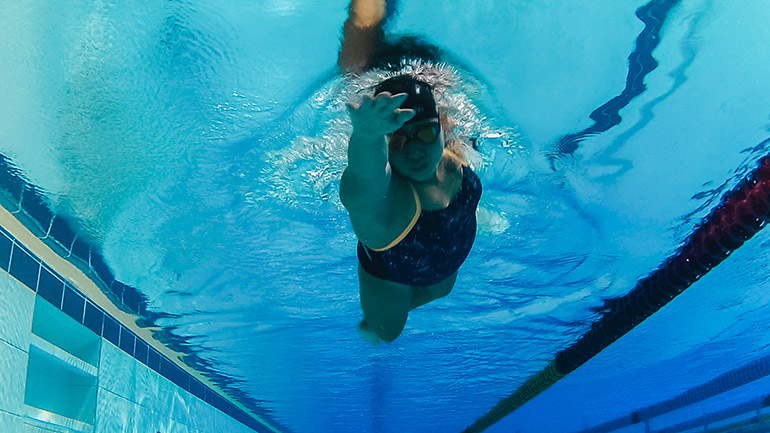An eight-year-old girl leaning on crutches stares up at a climbing frame in the playground. It’s tall. Too tall for her. But she wants to climb it anyway.
Most would expect her parents to react in horror and pull her away, but this little girl’s parents said: “Why not? Let her try.” And so she climbed the frame, bit by bit, until she reached the top.
Two decades later, 29-year-old Paralympian swimmer Theresa Goh still recounts this among her favourite stories. “I feel like that was one of the defining moments of my life, where if they had said no I would be more afraid of doing stuff,” she tells Southeast Asia Globe. “They didn’t want to hold me back, or want me to feel like I couldn’t do stuff.”
Goh has congenital spina bifida, a condition where there is a gap in the spine due to it not developing fully. She gets around in a wheelchair, as she does not have use of her legs. When Goh swims she keeps her legs neatly folded, propelling herself with only her arms and torso. Her swimming career has spanned 16 years, making her one of Singapore’s veteran para-athletes, and she has a whopping 27 Asean Para Games gold medals under her belt, along with numerous world records.

The road to Rio
However, she has not yet won a medal at the Paralympics, and Goh is gunning for a podium finish in Rio next month. The closest she has come to date was placing fourth in the 100m breaststroke SB4 in the 2008 Paralympics in Beijing.
We meet her at the Singapore Sports Hub shortly after her return from the IPC Swimming European Open Championships in Portugal, where she won a bronze medal for the 100m breaststroke SB4 and, for the first time in nine years, completed her 100m breaststroke swim in under two minutes. She obligingly changes into her swimwear and dons her personalised cap, doing a few laps for photos. It is hard not to admire the power in her arms and shoulders as she pulls herself through the water.

Goh has come a long way from her childhood days of splashing around in pools with her family. Worried that she may be leading too sedentary a life, her parents introduced her to swimming at the age of five. “My dad taught me a bit of a basic breaststroke, just to not drown,” she says with a laugh. “So he was my first coach, I guess.” She was spotted by a volunteer recruiting for Singapore’s Disability Sports Council seven years later and then started to swim competitively.
“It’s always been the place that I feel the most freedom,” Goh says of the pool. “There are no borders around me, no stairs, no stuff like that, physical barriers.”
Goh chats openly about her experiences, her Singaporean accent further highlighted by a liberal use of ‘Singlish’ phrases. “Some European countries, they got like those stupid gravel cobblestones, like, for what sia?” she blurts out as she compares her experiences of navigating cities in a wheelchair. Singapore, she says, is not too bad in terms of accessibility, although she still has to check out new locations on Google Satellite before setting out from home to figure out if there will be stairs to navigate.
Paralympic pioneer
Her long years of involvement in para-sports in Singapore have made her something of a pioneer, giving her firsthand experience of the development of sports in the country.
“I got to be the first to try a lot of things, and when they started being more inclusive, like when Singapore started merging the flag presentation ceremonies of the SEA Games and the Asean Para Games, I was usually the first to be there. It’s been nice, because you see a lot of growth and a lot more acceptance and inclusion,” she says. Ceremonies that would previously neglect para-athletes – or assume that their games could be subsumed under more well-known tournaments for able-bodied athletes – now ensure the para-athlete team is acknowledged and included.
Surviving as a full-time athlete in Singapore has also become more viable over the years. The government has been investing more and more in fostering local athletes to compete on the world stage, as well as funding sports-centric schools such as the Singapore Sports School, which opened in 2004 to provide young athletes with the opportunity to start training as early as possible.

“[Before I got a scholarship] there wasn’t any salary… it wasn’t financially realistic, but now it’s a real option that you can consider, and you can really just focus on your sport and not worry about anything else. It’s basically a job, but a job that you really, really, really enjoy. I couldn’t ask for anything better; it’s a dream thing,” Goh says.
But it is a dream that Goh very nearly missed out on. Although costs such as tournaments, training and travel were paid for, Goh had always only broke even and never made a salary as a professional swimmer. She was rejected the first time she applied for a scholarship in sports excellence, which provides athletes with a salary and funding to train full-time, in 2014. She tried again the following year, telling herself that the result would decide whether she quit or carried on training.
“I was 28 when I applied for the scholarship [the second time], and I felt like it was already the moment where if I didn’t get the scholarship I’d be very financially vulnerable and didn’t think I could continue any longer,” she says. “I need a job. I need to get financially comfortable and my parents are retiring soon.”
When asked what she would do if she quit training, Goh pauses. “I changed my mind a lot of times,” she says, but admits that she would prefer to stay in sports and work in an environment she is familiar with. Coaching is mentioned as an option.
What’s next for Theresa Goh?
Then she changes tack. “Thinking about non-sports options, I want to open a cat café,” she says. “I already have three [cats], so I can just put them there first. You know, the startup cats.” She pulls out her mobile phone to show us photos of her feline furkids, collectively known by their very own portmanteau of ‘Sblotches’: Seb, Lobster and Patches.
Fortunately – for her and her cats – Goh secured the scholarship on the second attempt, and things have been full steam ahead ever since. Formerly coached together with other swimmers of varying skill and disability levels, Goh and fellow Paralympic swimmer Yip Pin Xiu now have a new, dedicated coach in Mick Massey – the former coach of the British Paralympic swim team. The progress she has made is impressive.
“When I took on this job, I was asked if I could take Theresa into the final. Since then, she has improved by over 12 seconds [in the 100m breaststroke SB4],” Massey told Singaporean newspaper Today on their return from Portugal.
Goh has even surprised herself with her improved performance but tries not to fixate too much on winning medals.
“There are maybe three people fighting for the same medal spot. Everybody works hard, everybody trains their butt off, but in the end there can only be one person,” she says with a shrug. “It’s taken me so many years to get this in my head… And if I do get the medal there’ll be someone else who doesn’t get it, and they’re also sad. So I’ve figured out that in the end it doesn’t really matter whether I get the medal or not. It’s whether I really, really give my all, and whether I feel like I have nothing left to give.”


